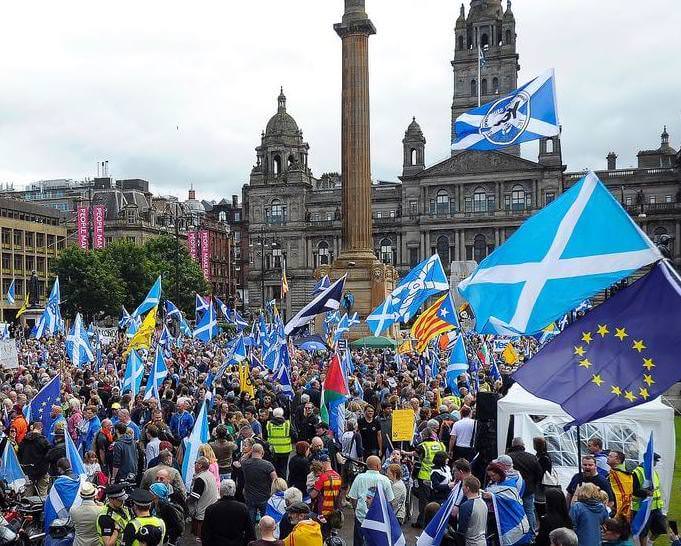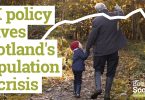Speaking with one of Scotland’s leading EU experts recently, she asked “Where is the Brexit bounce for independence?”
It’s a good question and she is not the only one asking. If Brexit is the trigger/justification for another Scottish independence referendum then why is it not significantly increasing independence support?
Several journalists and political commentators suggest that people may have voted Remain in Scotland but are not really that into the EU. Others are suggesting that it’s the SNP’s fault for not talking up independence. They are all missing the point, and although I worry that the SNP may not go at the right time, I can clearly see the strategy developing.
Going back to the 90s, the SNP had a bit of a stushie over the best route to independence. Fundamentalists said “win a majority in the new Holyrood Parliament and we declare independence”. On the other side we had gradualists, who wanted to take power in Holyrood, run the country whilst asking for more powers, then, having built trust with the Scottish people, win a majority, call a referendum. Gradualism has taken us within inches of the try line, and the touchdown is coming.
In 2014 did we ever stand a chance of winning when support began in the mid 20s? Realistically now, can we lose if we start at 45-47 per cent? Well yes, but only if we mess up completely and the easiest way to that is to dive for the line too early, or too late.
To hold and to win the next independence referendum we need four weapons. The first we have already – a mandate to call a referendum from a Yes-supporting Holyrood majority.
The second is a trigger, a justification for going again and Scotland voting remain by 62 per cent after we voted No to independence, and after being told a No vote was the only way to stay in the EU, supplies that trigger.
Thirdly, we need the first of two types of motivations. Brexit supplies an “away from motivation”. However, we don’t know exactly what the final arrangements for Brexit will be nor the full extent of the damage to Scotland’s economy, jobs, key industries and exports. This weapon won’t be fully available till we have the final Brexit arrangement, then we can explain how much more it will hurt Scotland than the rest of the UK and not before.
Finally, we need a “towards motivation”. It’s the push and pull of the two different motivations that will deliver a win, and for that we need a better economic vision of an independent Scotland than the 2014 White Paper delivered.
Sure, it was good but it lacked answers on the economic case and the SNP’s Sustainable Growth Commission and Business for Scotland’s pluralistic manifesto for a new economics for a new Scotland will be published soon, so you will be spoilt for choice! This is the key, for although Brexit is the trigger, referendum two will not be about Brexit. It will be about the positive economic vision for Scotland versus Westminster incompetence, of which Brexit is just one component.
Some make the case for an early referendum, pointing to independence support surging when it was given an absolute focus in 2014 and I can’t argue with that. Even in the face of an overtly biased media, staged interventions by the Queen, business friends of the Tory party, and foreign leaders who needed David Cameron’s support (he even asked Putin for help) the absolute focus delivered a 20 per cent-plus leap in support.
The trouble is we just can’t have that absolute focus until the Brexit fog clears. Imagine the SNP called it and we started campaigning using the impact of a hard Brexit as the away from motivation and then Theresa May concedes a soft Brexit and the UK stays in the single market and customs union. The Unionists would scream “cancel this unnecessary, decisive referendum, we gave you everything you wanted”. They wouldn’t have, because a soft Brexit is actually still so bad for Scotland that it offers all the “away from motivation” we need, but not if people are confused.
I don’t want a hard Brexit. A soft Brexit as part of the single market takes the hard borders issue off the table and makes either EU membership or EFTA membership for a transition period more workable than a hard Brexit.
That brings us back to gradualism. Nicola Sturgeon is the Queen of Gradualism (some think too gradual at times), but Theresa May understands it too. All those red lines the PM gave to the hardliners in her own party are vanishing with every new stage of the negotiations. Gradually she is conceding everything to the EU, just as I predicted at the start of the discussions. If she suddenly declared: we’ve no choice but a soft Brexit, then a leadership challenge and maybe even another General Election would follow, and we would be back to square one with a new PM that would still have to realise that Brexit is a Hobson’s choice. By retreating gradually, May can avoid rebellion and eventually say she had no choice once she has a compromise deal palatable to most of the UK population, if not to Johnson, Gove and Farage.
So if Sturgeon calls it now she risks losing everything as the battlefield moves beneath our feet. If she doesn’t, tries for another mandate and the next Holyrood election becomes a referendum – a desperate fight to deny a Yes majority through tactical voting – it keeps people in political tribes versus a single-focus independence referendum which allows for more switching.
Salmond had it easy, win a majority and the game was on. Sturgeon has a lot more thinking to do and therefore a harder job, so her gradual approach is valid and only hindsight will tell us if she is right. The weight of that decision must lie heavy on her shoulders, I hope she doesn’t carry it alone. When the Brexit deal drops we will have the “away from” motivation, once the positive vision of a prosperous successful and fairer independent Scotland is made clear, it will be time to pick a date.
When would you go?









“If Brexit is the trigger/justification for another Scottish independence referendum…”
It isn’t. Brexit is merely the context in which the new referendum is being held.
I see what you mean but as far as the once in a generation promise goes – it is Brexit that provides the moral justification to Westminster and therefor is technically the trigger.
Interesting article. I still think that we need to call and hold a referendum before the formal date of Brexit, 29 March 2019. But we don’t need. along campaign. the first Referendum had to instill in the electorate the concept of Independence. That isn’t needed now; now we need to put the strong case for Scotland making its own decisions. (And these are NOT the political/policy alternatives after Independence – but the PRINCIPLE of self-determination).
The campaign should be on bringing decision-making home, and not pretending that the only alternatives in an iScotland is a left-wing, socialist one. It’s about choice being held IN Scotland and not London. Those YES groups pushing a ‘leftish’ campaign have the wrong idea. That’s NOT why we want independence (if the Scottish people decide that’s what they want, it will happen). Independence must be ONLY about the choices. Sand those choice include having the possibility to choose a different economic policy. But the micro-specifics of the policies are NOT part of the campaign.
I recognise that this is a difficult ‘sell’ to make, as we will not be fighting on ‘black/white’ alternatives, but on the ability to choose an alternative at some future time. Timing is critical, but so is creating the scenario for the decision to be made. SNP/SG must start to challenge the bias from BBC in Scotland, and create the alternative scenario that Scotland can and should make its own decisions.
If we wait too long the Europeans won’t be allowed a vote and that’s a lot of numbers now on the YES side.
It’s a tricky one, looking at it just now, everyone in hospitality should be YES, every farmer requiring migrant labour should be YES and every company needing EU access should be pushing for YES.
I think a lot of people are sitting back and watching, waiting to see what happens